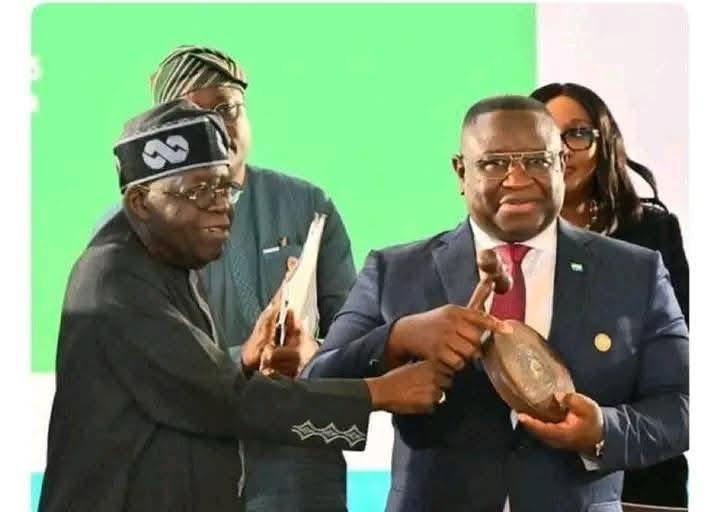New Era for West Africa as President Julius Maada Bio Assumes ECOWAS Chairmanship
Cairo, Egypt – 4 July 2025
At the 67th Ordinary Session of the Authority of Heads of State and Government, a significant transition unfolded in West Africa’s regional bloc as Nigerian President Bola Ahmed Tinubu formally handed over the chairmanship of the Economic Community of West African States (ECOWAS) to President Julius Maada Bio of Sierra Leone.
President Tinubu’s tenure was marked by unprecedented regional turbulence, including a wave of military coups in Mali, Burkina Faso, and Niger. These political upheavals culminated in the withdrawal of the three Sahelian countries from the bloc, challenging ECOWAS’s role as a pillar of democratic governance and regional cooperation.
Taking the mantle at a time of both challenge and opportunity, President Bio has laid out a bold and focused agenda structured around four key priorities:
1. Restoring Constitutional Order
2. Revitalizing Regional Security
3. Unlocking Economic Integration
4. Building Institutional Credibility
This vision, if realized, could represent a turning point in the fortunes of West Africa—a region rich in potential but hampered by instability, weak governance, and fragile economies.
President Bio’s ascension comes as ECOWAS faces existential questions. The recent withdrawals from the bloc have not only weakened its regional cohesion but also tested its ability to enforce democratic norms. In this context, Sierra Leone’s peaceful democratic track record under Bio offers a contrast and a beacon of stability.
With Sierra Leone not directly involved in the Sahel crises and maintaining a relatively calm political environment, President Bio may enjoy greater neutrality and credibility in leading reconciliation and reform efforts.
To turn rhetoric into results, President Bio will require the collective support of all 15 member states—politically, financially, and diplomatically. Key steps include:
Strengthening Mediation Mechanisms: ECOWAS must reinforce its diplomatic toolkit to engage with transitional governments and encourage pathways back to civilian rule through patient, principled diplomacy.
Enhancing Security Cooperation: Cross-border terrorism, trafficking, and banditry demand deeper military and intelligence collaboration, especially in regions vacated by departing member states.
Accelerating Trade and Infrastructure Projects: Economic integration can be advanced by breaking down trade barriers, investing in regional transport corridors, and finalizing the implementation of the ECOWAS Single Currency project.
Rebuilding Trust in ECOWAS Institutions: Transparency, inclusion, and public accountability must underpin ECOWAS operations to restore faith among citizens and governments alike.
In my personal opinion, to effectively manage ECOWAS and consolidate its relevance,
President Julius Maada Bio must prioritize restoring the bloc’s authority by ensuring member states uphold its statutes and democratic principles. This includes reinvigorating ECOWAS’s diplomatic influence to resolve political crises and reinforce constitutional rule through consistent engagement, sanctions where necessary, and dialogue-driven transitions.
Strengthening the ECOWAS Court of Justice is equally critical—its decisions must be respected and enforced uniformly to uphold rule of law and regional trust in ECOWAS institutions. By restoring credibility in its governance framework, ECOWAS can reposition itself as a legitimate and respected authority across the sub-region.
Economically, President Bio must fast-track cross-border trade facilitation and push for the adoption of the ECO as a single regional currency to reduce transaction costs and improve intra-African trade. Establishing reliable infrastructure and harmonizing regulations will ease the movement of goods and services, supporting the goals of the African Continental Free Trade Area (AfCFTA).
Additionally, ECOWAS must leverage Africa’s vast natural and human resources to foster inclusive growth—by investing in value-added industries, encouraging innovation, and promoting sustainable resource management. By linking economic integration with local beneficiation and industrialization, President Bio can help ECOWAS not only survive its current challenges but thrive as a united, prosperous regional bloc.
The successful handover between Tinubu and Bio is a testament to ECOWAS’s enduring framework, but the work ahead is daunting. Regional leaders, civil society, and international partners must rally behind the new ECOWAS leadership to ensure that the bloc emerges stronger and more united.
As President Bio assumes the chairmanship, the people of West Africa—and indeed the wider international community—watch with cautious optimism. The road to stability and prosperity may be steep, but with strategic focus and collective will, it is a journey worth taking.




